The “agony days” is how some residents of South Better Hope, East Coast Demerara refer to the Great Flood of 2005 and they pray those days never come again.
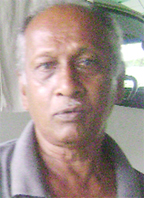
The waters of the January 2005 flood receded gradually, particularly from some of the ‘basin’ communities, after devastating the country’s coast and inner city and temporarily setting thousands back for months and even years. For some people the psychological damage has been permanent.
To mention the word flood is to open wounds and in a few cases, change some people’s mood to the point where they become hostile. It has been five years but people say the years have hurried by without them seeing much progress; some say the old calendars came down and new ones went up in homes still marked by water stains and empty of furniture and other possessions which they are struggling to replace.
One man who identified himself simply as ‘John’ flew into a sudden rage when this newspaper asked him on Monday how life has been in the years since the flood. “Is wha ya really askin me girl? I ain’t wan hear nothing about da flood or even talk about it cause da flood was stress! I lose all I had in da flood,” John said vociferously, attracting attention. Perhaps encouraged by the attention he then started preaching in a sermon-like tone about how bad life has been since he lost his home in the waters and everything he had worked for.
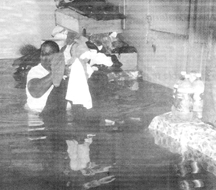
John now lives in what he called “a house I mek back” and his description of it captures what the shack looks like. It is home to him, his four children and wife. He said the floodwaters disrupted life as they know it and have set them back for a good time.
“I ain’t wan them days again, not now, not ever! Is sheer agony girl, sheer agony,” John said before turning to speak to the little girl nagging at his side. His wife was a few feet away and while he spoke she nodded in agreement, but chose not to join in the conversation. John directed this newspaper to the home of Ramkissoon David who lost his wife in the floodwaters saying, “Da man wife dead and he was never the same, talk to he.”
Leptospirosis
death
Ramkissoon David was enjoying a quiet afternoon in the company of a feisty grandson and was happy to talk. He urged this reporter to sit down and ask him anything, but when the flood came up his mood changed. His wife, Jesmin Ramkissoon died of leptospirosis which was lurking in the floodwaters and had infected several persons.
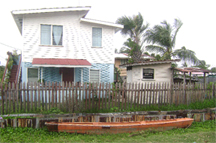
“She just get sick and we never know wha it was and she didn’t want to see a doctor until it too late,” David said as he recalled the last days his wife spent with the family.
He recalled that floodwaters had swamped the downstairs of the home forcing the family to shelter and live in the upper flat for nearly 20 days. The damage, he said, was immense after the water had receded and the family started to assess the losses. David said carpets and furniture and appliances were ruined, but those losses hardly moved the family when his wife died; she was the one thing the floodwater claimed that the family could not replace.
“She gone and left me hay. We surviving and trying to move on, but she gone,” David said. He said it took roughly four months before the family was able to live without fear of contracting a disease in their home and around a year before they started to “pick up the pieces”. He said that the state assistance which was promised to families never reached him. “I went and went so many times everywhere and after they keep pushing me around I ain’t go back.” However, he said the money paled in comparison to his losses which he stressed were well beyond the promised sum.
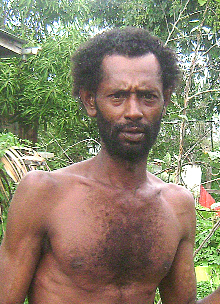
Grief still visible on his face David said life has been “just okay”. The family was able to move on, but could not forget what happened in January 2005. “It changed things. We still see the water stain and it reminds us,” he added.
Breast-high water
Some distance away from David this newspaper met a pregnant Yvonne Roberts who said of the flood “I remember it and it was not nice”. She spoke of diseases and the condition of the floodwater saying it was “the most disturbing thing”. Roberts said she had a young son at the time and was afraid of the threat the water posed to him; she was more worried about that than whether food was being served “on the line top”.
But food and clean water were important and she recalled wading through breast-high water every day during that period to fetch both. Roberts said she lacked the resources to pay for the services of the boats operating in the area so whenever she ventured out it was her and the water. “I use to fetch clean water from the line top to home,” she said laughing and recalled that she used to float the plastic bucket on the floodwaters.
Her home situation was “serious”, she said, since the home was opened to relatives who were suffering more than she was. Roberts said brothers and their families showed up and that “we all share that space” for about 16 days. She said the family had to fetch food through the assistance which was offered by government.
The pain on her face was evident as she recalled the death of David’s wife. She said the woman was known in the area and that “two other persons also died”. Roberts could provide no information on the other persons, but she insisted that the flood claimed at least three lives in Better Hope.
Fled the area
Roberts dragged this reporter, quite literally, to speak with Hubert De Souza, a pensioner living in the area. He smiled after realizing that an interview was the reason for the visit then questioned why he should “go back” to that time.
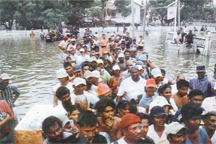
Roberts without hesitating declared that Stabroek News was there to find out “how we made out” and whether things are okay. She tied the flood to the devastation in Haiti saying “we didn’t had it so bad”, but that some Guyanese who suffered can offer hope to those who currently feel hopeless in the Caribbean country.
De Souza then opened up about how he was forced to sell off his livestock including pigs, chickens and ducks for “anything” and flee the area. He packed up and stayed away until the water receded, but his return was as painful as when he left. De Souza recalled that the lower flat of his home was devastated beyond words and that it took a considerable period of time before he was able to move on, but he noted the money he had from the sales “came in handy”. He said the reason he fled the area was because the water was “too cold” and had posed potential problems for his health.
De Souza said his heart bled for the persons in the area who had no way of coping with the flood and were forced to suffer through the period. He said many people endured much, but came out in one piece. He observed that many are still fighting to “get back up”.
‘We surviving’
Magnify the problems at Better Hope South during the Great Flood 100 times and the picture of what was unfolding at Better Hope South squatting area emerges. The squatting settlement was in complete chaos with many of the structures were actually completely covered by water.
“Is duck some houses duck,” Neville Kellman told Stabroek News as he attempted to explain what happened.
Kellman said he braved the waters and took the initiative to build a home within his home, which he said involved some ply boards. Kellman basically erected the boards in the home some eight feet high and that was where he and his wife slept since they decided to send the children away to stay at a relative’s home.
The man recalled that the flood ruined his farmlands which “tek blows til now” and he has had to divert from farming to hunting. Kellman said he now roams the backlands in the area to pick whatever he could find to sell. “It’s a living,” he said of his new life because it supports his family.
He pointed to the water stains on the house to indicate the level of the water back in 2005 and he also showed us his farm.
He said that the government’s assistance to farmers was never paid out to him because persons in the squatting area are not considered “Better Hope residents”. Kellman said he was not prepared to beg anyone for the assistance and he simply moved on with his life. He is struggling but he said he is getting by “one day at a time”.
Several residents in the squatting settlement barely offered a few words when asked about the flood saying they were badly hit but basically ignored. “We surviving sis, we surviving”, one man said before he went off to cut a few coconuts in his backyard.
